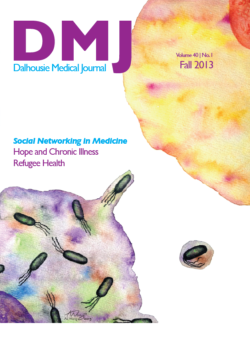Optimization of a Molecular Genetic Assay for the Sensitive Detection of KRAS Mutations in Colorectal Carcinoma
DOI:
https://doi.org/10.15273/dmj.Vol40No1.3790Abstract
Activating mutations of codons 12 and 13 of the KRAS gene occur frequently in colorectal carcinomas. Clinical trialshave shown patients with metastatic colorectal cancer benefit from treatment with tyrosine kinase inhibitors, eg.Vectibix (panitumumab), used to block EGFR overexpression if point mutations in codons 12 or 13 of the KRAS geneare absent. The DxS KRAS mutation kit, mandated by Health Canada as a companion diagnostic, doubled in price to$200-$500 per patient tested, making it less attractive for use by clinical laboratories. Using 25 cases of colorectalcancer previously analyzed by an external laboratory, we validated and compared DxS (Amplification Refractory)and a less costly method, SNaPshot (Primer Extension), for KRAS mutation analysis as well as two extractionmethods, Qiagen FFPE and PicoPure. We demonstrated that DNA purified using the Qiagen FFPE kit produced moreconsistent results. KRAS mutation status was obtained for all samples assayed and were compared with results fromthe external laboratory. Both DxS and SNaPshot met the required analytic sensitivity of 1% mutant to wild-typebackground. One sample was discordant by both assays with those previously reported due to either the assaysor sampling from a different location in the tumour tissue. SNaPshot detected a Gly13Asp variant as an artefactin addition to the correct genotype in four samples. DNA quality from the fixed tissues and PCR amplificationconditions were investigated as the cause. After further validation and refinement of the amplification conditions,the SNaPshot method has now been adopted for clinical use.Downloads
Published
2013-11-10
How to Cite
Miao, I., & Taylor, S. A. (2013). Optimization of a Molecular Genetic Assay for the Sensitive Detection of KRAS Mutations in Colorectal Carcinoma. DALHOUSIE MEDICAL JOURNAL, 40(1). https://doi.org/10.15273/dmj.Vol40No1.3790
Issue
Section
Research
License
Authors who publish with this journal agree to the following terms:
- Authors retain copyright and grant the journal right of first publication with the work simultaneously licensed under a Creative Commons Attribution License that allows others to share the work with an acknowledgement of the work's authorship and initial publication in this journal.
- Authors are able to enter into separate, additional contractual arrangements for the non-exclusive distribution of the journal's published version of the work (e.g., post it to an institutional repository or publish it in a book), with an acknowledgement of its initial publication in this journal.
- Authors are permitted and encouraged to post their work online (e.g., in institutional repositories or on their website) prior to and during the submission process, as it can lead to productive exchanges, as well as earlier and greater citation of published work (See The Effect of Open Access).


